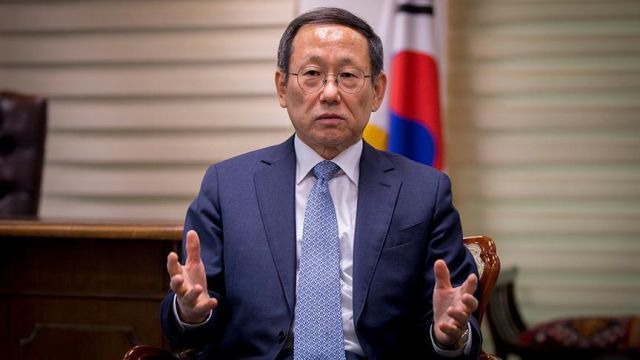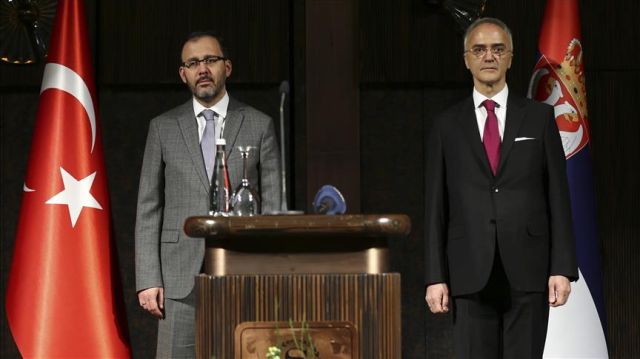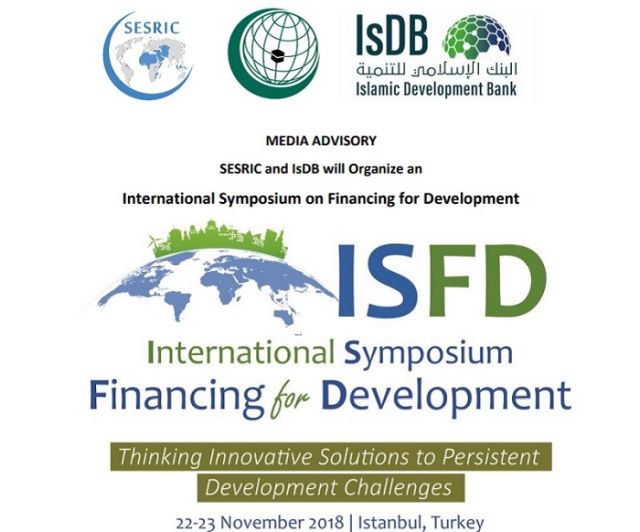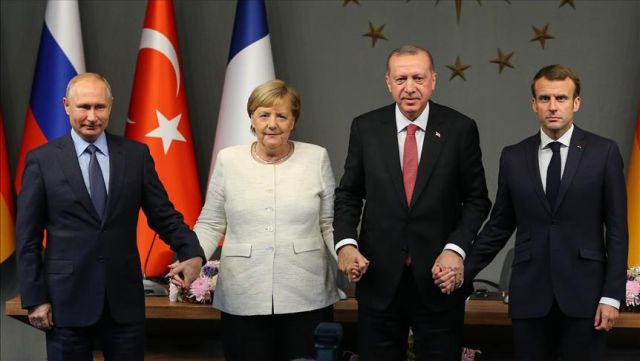
by admin | May 25, 2021 | World
 By Merve Ozlem Cakir,
By Merve Ozlem Cakir,
Ankara: The South Korean ambassador to Turkey said Monday a deal signed last August will boost trade volume between the two countries.
“We expect more investments and trade in the service sector in the future,” Ambassador Choi Hong-Ghi told Anadolu Agency in an exclusive interview.
Turkey and South Korea signed a free trade agreement on May 1, 2013, and with the Agreement on Trade in Services and the Investment Agreement signed last August, the free trade deal has become more efficient.
Ambassador Choi said the trade volume between the two countries was up from $16,000 in 1965 to $7.2 billion in 2018, adding that last year, Turkey’s exports to South Korea were worth $1.2 billion whereas South Korea exported $6 billion worth of goods to Turkey.
He said more than half of Turkey’s imported goods consists of spare parts in the automotive sector.
“Hyundai produces hundreds of thousands of cars annually and 90 percent [of production] is exported to Europe, which contributes to Turkey’s economy.”
He said Turkey’s export volume to South Korea went up 58.6 percent in 2018, adding: “In a bilateral meeting in December 2017, the presidents of the two countries agreed that the current trade volume should be increased to $ 15 billion.”
Choi said more than 160,000 South Koreans visited Turkey, and 30,000 Turks visited South Korea in 2018.
“We hope that the number of South Koreans visiting Turkey will go up steadily.”
He said the interest for Turkish electronics brands such as Beko has been growing South Korea.
Choi said Turkish investments in South Korea, which he said stood around $100 million, should rise to match $2.9 billion worth of South Korean investments in Turkey.
Choi said the focus should not be only on the efforts to close the trade gap between the two nations, but also on devising economic structures that complement each other.
—AA

by admin | May 25, 2021 | Muslim World

Turkey’s Minister of Youth and Sports, Mehmet Muharrem Kasapoglu (L) and Serbia’s Ambassador to Turkey, Zoran Markovic (R)
By Muhammet Ikbal Arslan,
Ankara: Turkey and Serbia should aim to increase their bilateral trade volume to $2 billion in the near future, Turkish Minister of Youth and Sports Mehmet Muharrem Kasapoglu said Tuesday.
“As our presidents Recep Tayyip Erdogan [of Turkey] and Aleksandar Vucic [of Serbia] agreed, our aim should be increasing the bilateral trade volume between Turkey and Serbia to a level of $2 billion as soon as possible,” Kasapoglu told a reception marking Serbia’s National Day, Serbian Armed Forces Day and the 140th anniversary of Turkish-Serbian diplomatic relations.
Kasapoglu said it was a welcome development that bilateral trade volume surpassed $1 billion for the first time in 2017, adding the two countries have a serious potential to improve economic and trade relations.
“Serbia is a valued friend of our country and a partner with whom we have strong cooperation for improving prosperity and stability in the Balkans,” he said.
Noting that fruitful dialogue between the two countries was of great importance for the establishment of security in the region, Kasapoglu added: “We have full belief in our friend Serbia that its support for our country’s efforts to eliminate FETO [the Fetullah Terrorist Organization] will increasingly continue in the coming period.”
FETO and its U.S.-based leader Fetullah Gulen orchestrated the defeated coup of July 15, 2016 which left 251 people martyred and nearly 2,200 injured.
Ankara also accuses FETO of being behind a long-running campaign to overthrow the state through the infiltration of Turkish institutions, particularly the military, police and judiciary.
Serbia’s Ambassador to Turkey, Zoran Markovic, for his part said his country wants to improve relations with Turkey, adding the two countries share common roots, history and culture.
Praising relations between Ankara and Belgrade, Markovic said: “We have a dialogue that ensures the highest level of lasting and mutual benefit.”
—AA

by admin | May 25, 2021 | Muslim World
 Istanbul : The Turkish city of Istanbul will host Thursday the International Symposium on Financing for Development, under the theme of “Thinking Innovative Solutions to Persistent Development Challenges”.
Istanbul : The Turkish city of Istanbul will host Thursday the International Symposium on Financing for Development, under the theme of “Thinking Innovative Solutions to Persistent Development Challenges”.
The two-day event is being organized by the Statistical, Economic, Social Research and Training Centre for Islamic Countries (SESRIC), a subsidiary organ of the Organization of Islamic Cooperation (OIC), and the Islamic Development Bank (IsDB).
The symposium will provide a platform for dialogue and discussions among policymakers, policy-advisors, practitioners and academicians to address the problems related to financing for development.
The current 57 member states of the OIC are highly diversified in terms of their level of economic development and many of them require a substantial amount of resources to finance their development.
These countries continue to face persistent development challenges, mainly due lack of adequate resources and ineffective use of existing resources. Meanwhile, there are also a growing number of OIC member states that have been active in supporting development in other developing countries, but their role in development assistance is not properly recognized at global levels.
In order to address the development finance challenges, alternative mechanisms are being voiced across the globe. A particularly strong mechanism that becomes increasingly popular is the Islamic finance instruments in financing for development, which can be instrumental for OIC countries in fostering development when effectively utilized.
In this connection, the symposium aims to identify the opportunities for innovative financing mechanisms, including Islamic finance instruments, as well as effective utilization modalities of existing resources for financing development in developing countries, with a particular focus on OIC member countries. It will also highlight and discuss the growing role of some OIC countries as development financiers and emerging donors in achieving global development goals.
—AB/UNA-OIC

by admin | May 25, 2021 | Business Summit, Events, Social Round-up, World
 Beijing / Jakarta / Paris / Kuala Lumpur: Saturday’s four-nation Istanbul summit on Syria between Turkey, Russia, Germany, and France garnered major coverage by the international media.
Beijing / Jakarta / Paris / Kuala Lumpur: Saturday’s four-nation Istanbul summit on Syria between Turkey, Russia, Germany, and France garnered major coverage by the international media.
Chinese news agency Xinhua on Sunday reported Turkish President Recep Tayyip Erdogan’s remarks that the summit would succeed in “adopting a sincere and constructive approach,” under the heading “Turkey hosts 4-way summit to seek political solution to Syrian issue.”
China Central Television stressed the leaders’ call to establish a lasting cease-fire and assemble a committee to draw up a new Syrian constitution, underlining French President Emmanuel Macron’s remarks on the need to abide by to the Sept. 17 agreement between Turkey and Russia to establish a demilitarized zone in Idlib, Syria.
Japanese public broadcaster NHK also stressed the issue of forming a constitutional committee in Syria by the end of the year to “lay the groundwork for democratic elections.”
Indonesian daily Tempo underlined the importance of the Idlib deal as well as Turkey’s proximity to the Syrian conflict and the difficulty in slowing or stopping a new migration wave should clashes resume.
Likewise, French media stressed the call to uphold a lasting and stable cease-fire in Idlib and gather a constitutional committee by year’s-end.
Le Monde reported the decision to underscore the need to “ensure humanitarian organizations’ rapid, safe and unhindered access throughout Syria.”
State broadcaster France Info reported on the reaffirmed commitment to the “safe and voluntary return of refugees to Syria” and to fight terrorism throughout the country.
Erdogan, Russian President Vladimir Putin, German Chancellor Angela Merkel and French President Emmanuel Macron in a joint statement on Saturday called for a constitutional committee on Syria for free and fair elections in the war-torn nation.
The leaders “expressed their support for an inclusive, Syrian-led and Syrian-owned political process that is facilitated by the United Nations,” according to the statement.
Reporting by Fuat Kabakci, Mahmut Atanur, Omer Aydin and Omer Faruk Yildiz :Writing by Ahmet Salih Alacacı
—AA

by admin | May 25, 2021 | Muslim World
 Istanbul : A major consultative workshop was held recently here for two days in Turkey on IsDB’s policy of engagement with the Civil Society Organizations (CSOs) in different member countries.
Istanbul : A major consultative workshop was held recently here for two days in Turkey on IsDB’s policy of engagement with the Civil Society Organizations (CSOs) in different member countries.
A joint effort by IsDB and SESRIC and partners in collaboration with IsDB Group Regional Hub Turkey, the event was held on the sidelines of the workshop on “enhancing humanitarian response and resilience through civil society organizations in OIC member states.” A host of experts and professionals attended the consultative seminar including those from Jordan, Nigeria, Afghanistan, Somalia, the OIC, SESRIC, IsDB, UNDP, UNHCR, IITA, Turkish Red Crescent, Pakistan Poverty Alleviation Fund, Save the Children, IFRC in Africa, IHH, Doctors Worldwide Turkey, and Islamic Relief Worldwide.
The consultative workshop came in line with the Global Agenda 2030 as the IsDB remains at the forefront of addressing diverse challenges faced by its member countries in various economic and social sectors.
Since the 10-Year Strategy of the Bank calls for inclusive social development and more participation of NGOs / CSOs in IsDB development interventions, IsDB has embarked on the preparation of a CSOs engagement policy to provide guidance on its interventions with CSOs among other things NGOs, community groups, foundations, and think tanks. The policy aims first, to create a framework of dialogue, consultation and partnership with CSOs in order to foster the sharing of knowledge and experiences; and improve the direct assistance to local communities in member countries and or Muslim communities in non-member countries through CSOs.
A policy study has also been commissioned to take stock of the internal strengths, weaknesses, opportunities, and threats in relation to the Bank’s capability to engage with civil society across all its operations. Moreover, a review and assessment exercise of other Multilateral Development Banks’ engagement with CSOs has been carried out to benchmark the policy with the involvement of similar organizations.
—SM/UNA-OIC





